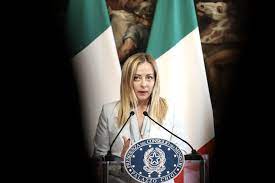Italy in markets’ crosshairs as Meloni readies difficult budget

Rome: Italy is under growing market scrutiny as Prime Minister Giorgia Meloni prepares a difficult 2024 budget, with investors dismayed by government moves affecting sectors from banks to airlines.
The Treasury will issue new economic targets on Wednesday providing the framework for a budget in which Meloni will attempt to keep her tax-cutting promises while also lowering the fiscal deficit.
The task is made all the harder by a weakening growth outlook and costly financial incentives for green home improvements which were introduced long before she took office but continue to weigh on public accounts.
“This budget is Meloni’s first real economic test since she came to power last October,” said Tim Jones, euro zone analyst for market consultancy firm Medley Advisors.
“With the European Central Bank backing off as a buyer of Italian bonds she’s now going to have to make the kind of choices that have slow-punctured every other Italian coalition for the last 30 years.”
Meloni has much less room for manoeuvre than when she hiked deficit targets in her first budget a year ago.
Now there is a growing emphasis on fiscal consolidation at the European level, with governments negotiating over new fiscal rules to be introduced next year after they were suspended in 2020 due to the COVID-19 pandemic.
This comes amid signs of souring market sentiment towards Italy, something Meloni can ill afford as long as she needs buyers for a public debt equal to about 142% of national output, proportionally the second largest in the euro zone after Greece.
The gap between the yields on Italian benchmark 10-year BTP bonds and safer German Bunds has risen to around 1.86 percentage points (186 basis points), the widest since late May.
“The supportive factors that allowed the spread to reach our 160 basis point bull-case scenario have vanished,” Morgan Stanley said this month in a note to clients. “We expect higher fiscal deficits and weaker growth.”
It forecast the spread would rise to 200-210 basis points by the end of the year.
Italy now expects this year’s deficit to overshoot at around 5.5% of GDP compared with a 4.5% official target, sources have said.
Rome also plans to raise its 2024 budget deficit target to between 4.1% and 4.3% of GDP, up from the 3.7% goal set in April, sources familiar with the matter said.
After a cautious start, Meloni’s rightist government began raising investors’ eyebrows when it repeatedly attacked the European Central Bank over its interest rate hikes, and then refused to sign off on an EU reform of its bailout fund.
Italy is the only EU country holding out against reform of the fund, called the European Stability Mechanism (ESM), with its ruling coalition concerned the proposed changes will make it more likely Rome will have to restructure its debt.
Unease over Meloni’s economic vision spiked last month when the government announced an unexpected windfall tax on bank profits which hit lenders’ shares before various attempts at clarification quelled market panic but not uncertainty.
The move prompted a flurry of calls from worried international investors, a top Italian banker said on condition of anonymity, and forced asset managers back from their holidays to deal with the market rout.
Episodes targeting airlines and investors in Italy’s 307- billion-euro ($326.74 billion) bad loan market have followed a similar pattern.
Last week the government dialled down plans to cap air fares for flights to Italian islands after airlines including Ryanair (RYA.I) challenged the legality of its initial proposal.
Roberto Perotti, economics professor at Milan’s Bocconi university, said the proposed limit on air fares showed Meloni’s Brothers of Italy party has “no free-market culture”.
Days after the bank tax, Brothers of Italy tabled a plan to allow debtors to pay off their arrears at a discount, effectively setting a profit cap for firms that buy the bad debt from banks to then make money from enforcing its repayment.
Meloni subsequently said no measures were planned regarding non-performing loans, but her party’s proposal is still before parliament and uncertainty persists.
Meanwhile, economic pitfalls are mounting up. Aside from the budget and the tensions over the ESM, Italy is also struggling to meet policy targets agreed with Brussels to unlock billions of euros of post-pandemic recovery funds.
It is not just investors who are fretting about Italy. Two EU central bank governors, also speaking on condition of anonymity, said at a recent gathering of EU policymakers that they were concerned about Rome’s public finances.
A third said the Bank of Italy’s frequent dovish remarks raise doubts about its inflation-fighting commitment, and a fourth said the ECB should not completely halt its government bond purchases due to the risk of a surge in Italian yields.





